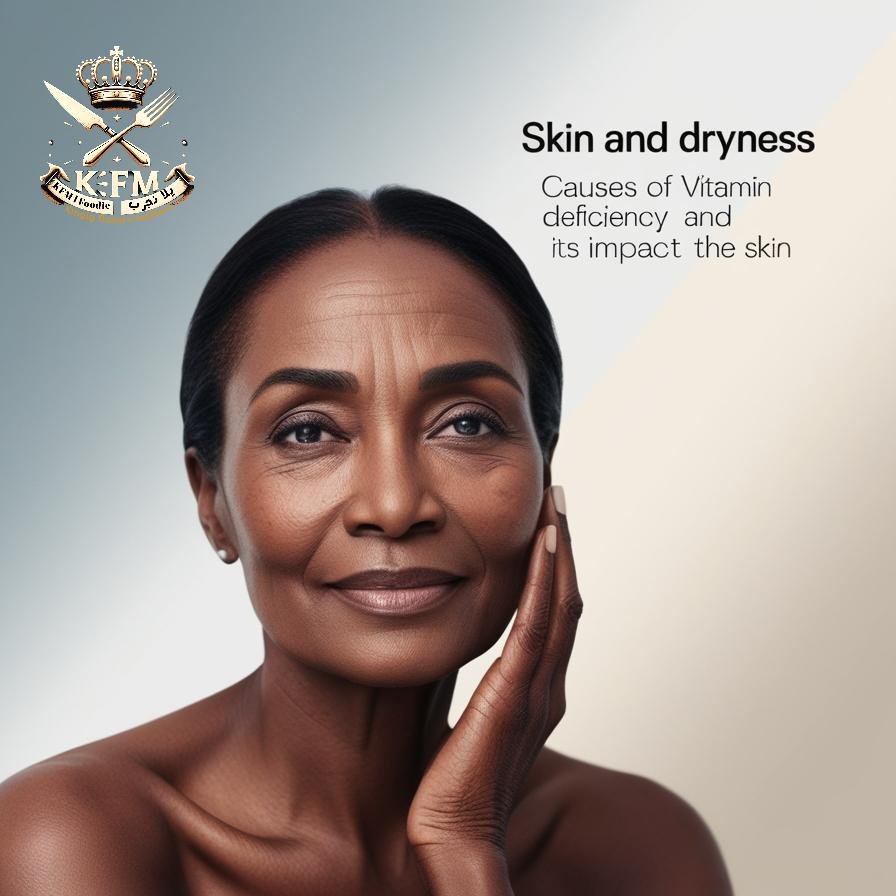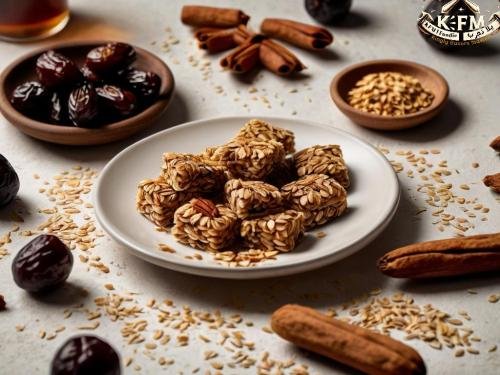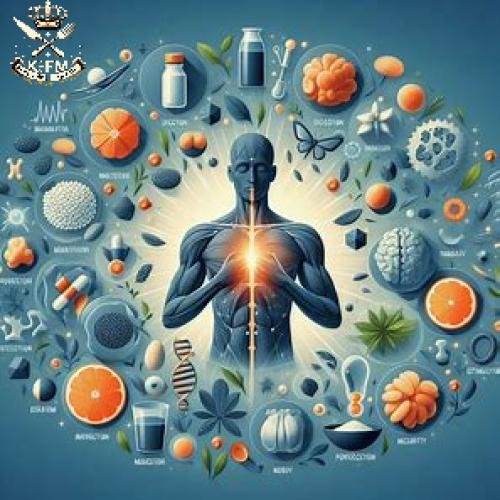Skin and Dryness: Causes of Vitamin Deficiency and Its Impact on the Skin
The skin is the outer layer that protects the body from harmful environmental factors and plays an important role in a person’s overall appearance. Skin health largely depends on proper nutrition and hydration levels, but a deficiency in certain vitamins can lead to skin problems such as dryness or loss of radiance. In this article, we explore the causes of dry skin, symptoms of vitamin deficiency, and the key foods that can help improve skin health.

What Causes Dry Skin?
According to medical sources such as the Cleveland Clinic and Healthline, dry skin can result from several factors:
- Lack of hydration: Not drinking enough water daily.
- Climatic factors: Exposure to dry or cold air.
- Use of harsh chemical products: Such as strong soap or detergents.
- Chronic skin conditions: Like eczema or psoriasis.
- Vitamin deficiency: A lack of essential vitamins and minerals plays a significant role in skin health.
- Environmental pollution: Exposure to pollutants damages skin cells.
- Lack of sleep and psychological stress: Weakens the skin's function as a protective barrier.
Symptoms of Vitamin Deficiency on the Skin
According to WebMD and Face Clinic London , vitamin deficiency directly affects skin health and manifests as:
- Dryness and cracking of the skin: Often caused by a deficiency in Vitamin A, essential for skin cell renewal.
- Pale and dull skin: Resulting from a deficiency in Vitamin C, which aids in collagen production.
- Premature wrinkles: Due to a lack of antioxidants such as Vitamin E.
- Increased skin sensitivity: Vitamin D deficiency can raise the risk of skin inflammation.
- Dull and inflamed skin: Caused by a deficiency in zinc, which is crucial for tissue repair and cell regeneration.
The Risk of Vitamin Deficiency on Overall Health and Skin
Not getting the necessary vitamins can lead to more serious complications than just skin problems. According to NCBI reports, vitamin deficiency may cause:
- Weakened immune system: Especially with a lack of vitamins D and C.
- Slow wound healing: Due to a deficiency in zinc and vitamin K.
- Increased oxidative stress: Leading to accelerated aging.
Best Foods to Improve Skin Health
Including foods rich in essential vitamins in your diet can improve skin health and reduce dryness. According to Healthline and Cleveland Clinic :
- Vitamin A:
- Sources: Carrots, sweet potatoes, spinach.
- Role: Enhances skin smoothness and promotes cell renewal.
- Vitamin C:
- Sources: Oranges, strawberries, broccoli.
- Role: Stimulates collagen production and protects against sun damage.
- Vitamin E:
- Sources: Almonds, avocados, olive oil.
- Role: Acts as an antioxidant, preventing skin dryness.
- Vitamin D:
- Sources: Fatty fish, eggs, sun exposure.
- Role: Reduces skin inflammation and improves skin elasticity.
- Zinc:
- Sources: Oysters, nuts, legumes.
- Role: Aids in wound healing and cell regeneration.
- Omega-3 Fatty Acids:
- Sources: Chia seeds, salmon, walnuts.
- Role: Improves skin elasticity and hydration.
Vitamin- and Mineral-Rich Recipes for Healthy Skin
Quinoa and Kale Salad
[ Recipe Link ]
This salad is rich in complete protein and magnesium from quinoa, which enhances skin elasticity. Kale provides vitamin C, which boosts collagen production and improves skin health. Chia seeds and omega-3 help hydrate the skin and improve its elasticity.
Carrot and Ginger Soup with Turmeric and Coconut Milk
[ Recipe Link ]
Carrots are rich in beta-carotene, which converts to vitamin A and aids in skin cell renewal. Ginger improves circulation and brightens the skin, while turmeric and coconut milk provide anti-inflammatory properties and skin hydration.
Three Nutritious Recipes to Improve Skin Health
Avocado and Chickpea Salad
Short Description: A nutrient-packed salad that combines creamy avocado and delicious chickpeas, perfect as a snack or side dish. Ingredients: Avocado, boiled chickpeas, lemon juice, olive oil, parsley, salt, and pepper. Benefits and Vitamins:
- Contains vitamin E from avocado to support skin health.
- Rich in plant-based protein and fiber from chickpeas to improve digestion.
- Antioxidants from parsley and lemon to boost immunity.
Red Lentil Soup with Turmeric
Short Description: A warm, nourishing soup based on red lentils and anti-inflammatory turmeric. Ingredients: Red lentils, turmeric, onion, garlic, olive oil, vegetable broth, cumin. Benefits and Vitamins:
- Rich in iron and plant-based protein to improve energy.
- Turmeric contains curcumin, which reduces inflammation.
- The fiber in lentils supports digestive health.
Strawberry and Banana Oat Smoothie
Short Description: A healthy and tasty drink perfect for breakfast or as a snack. Ingredients: Fresh strawberries, banana, oats, yogurt, honey. Benefits and Vitamins:
- Vitamin C from strawberries to stimulate collagen production.
- Potassium from banana to support heart health.
- Oat fiber to improve satiety and regulate blood sugar levels.

Tips for Caring for Dry Skin
To achieve healthy and radiant skin, experts at Mayo Clinic recommend the following tips:
- Drinking enough water daily (8-10 cups).
- Using moisturizing creams with natural ingredients like shea butter or coconut oil.
- Avoid using harsh products on the skin, such as fragranced soap.
- Eating foods rich in essential vitamins and minerals.
- Using sunscreen when going out, even on cloudy days.
- Getting enough sleep to improve skin cell renewal.
Frequently Asked Questions
- What is the difference between dry skin and dehydrated skin?
- Dry skin is a skin type that lacks natural oil production.
- Dehydrated skin is a temporary condition caused by a lack of moisture, and it can affect any skin type.
- How do I choose the right moisturizer?
- It is recommended to choose a cream containing hyaluronic acid, glycerin, or shea butter. For sensitive skin, choose a fragrance-free cream.
- Are dietary supplements useful for improving skin health?
- Yes, especially if it is difficult to get vitamins from food. However, it is important to consult a doctor to avoid overdosing.
- What are the best times to take dietary supplements?
- Supplements containing fat-soluble vitamins (A, D, E, K) should be taken with a meal that contains fat. As for vitamin C and zinc, it is preferable to take them with water or natural juice.
- Can excessive vitamin intake cause skin problems?
- Yes, for example, excessive vitamin A can lead to dryness and peeling of the skin, or excessive zinc intake may cause irritation.
- What are the natural alternatives for dry skin care products?
- Using natural oils such as coconut oil or olive oil as moisturizers.
- Creating a deep moisturizing mask with honey and avocado.
Conclusion:
The skin is not just an external barrier but a true reflection of your internal health. Taking care of your skin begins with a balanced diet and avoiding factors that cause dryness. By incorporating essential vitamins and maintaining a daily skincare routine, you can keep your skin healthy and glowing. If you face persistent issues, it's best to consult a specialist for proper diagnosis and treatment.
Sources Used: Cleveland Clinic, Mayo Clinic, NCBI, Healthline, WebMD, Face Clinic London, Britannica.




















